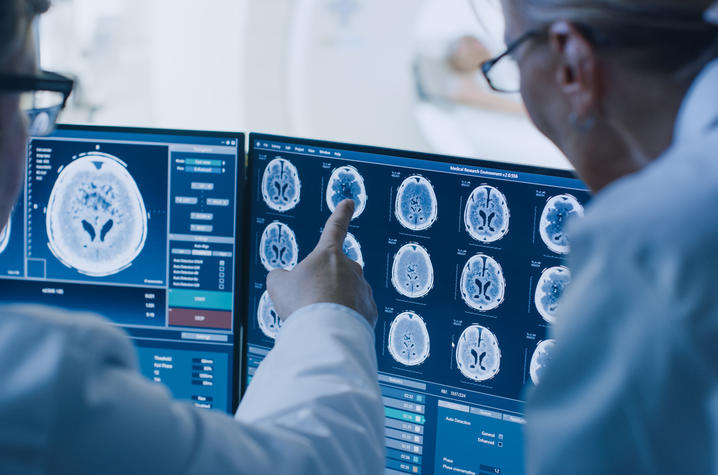Markey study highlights brain-preserving radiation technique for rare cancer

LEXINGTON, Ky. (Dec. 16, 2024) — A recent University of Kentucky Markey Cancer Center study highlights a radiation therapy technique that treats brain tumors while preserving patients’ cognitive function. The treatment approach could offer hope for patients with a rare and aggressive form of brain cancer.
The study, published in the medical journal Cureus Dec. 2, details the use of hippocampal-sparing whole brain radiotherapy (HS-WBRT) to treat a patient with a rare type of tumor known as atypical carcinoid. This specialized technique delivers radiation to the brain while protecting the hippocampus, a region critical for memory and learning.
Atypical carcinoid tumors are rare cancers that originate most commonly in the gastrointestinal tract or lungs and can spread to other parts of the body. When these tumors spread to the brain, they present a challenging case for doctors, as there are few established treatment guidelines due to the rarity of such cases.
“Every advancement in treating this rare form of cancer is significant,” said James A. Knight II, M.D., lead author of the study and a radiation oncology chief resident in the UK College of Medicine. “This case shows we can target the cancer while protecting the brain’s memory center, offering patients more effective treatment and better quality of life.”
Traditional whole-brain radiation therapy, while effective at treating tumors, is associated with cognitive decline in patients. The team’s approach using hippocampal-sparing therapy showed promising results: Follow-up brain scans showed a decrease in tumor size and number, while the patient maintained stable memory and cognitive function nearly a year after treatment.
The research team included UK Markey Cancer Center radiation oncologists Waleed F. Mourad, M.D., and Aradhana Kaushal, M.D., as well as UK College of Medicine pathology chief resident Hafsa Nebbache, M.D.
The case highlights the utility of HS-WBRT as a treatment approach for patients with metastatic atypical carcinoid brain tumors. In addition to recommending more frequent brain imaging for early detection in high-risk patients, the study authors highlighted the need for clinical trials focused specifically on atypical pulmonary carcinoids.
UK HealthCare is the hospitals and clinics of the University of Kentucky. But it is so much more. It is more than 10,000 dedicated health care professionals committed to providing advanced subspecialty care for the most critically injured and ill patients from the Commonwealth and beyond. It also is the home of the state’s only National Cancer Institute (NCI)-designated Comprehensive Cancer Center, a Level IV Neonatal Intensive Care Unit that cares for the tiniest and sickest newborns, the region’s only Level 1 trauma center and Kentucky’s top hospital ranked by U.S. News & World Report.
As an academic research institution, we are continuously pursuing the next generation of cures, treatments, protocols and policies. Our discoveries have the potential to change what’s medically possible within our lifetimes. Our educators and thought leaders are transforming the health care landscape as our six health professions colleges teach the next generation of doctors, nurses, pharmacists and other health care professionals, spreading the highest standards of care. UK HealthCare is the power of advanced medicine committed to creating a healthier Kentucky, now and for generations to come.




